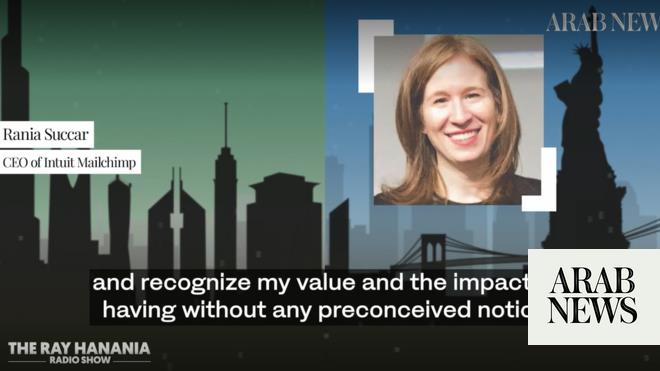
CHICAGO: Rania Succar, who was named CEO of Intuit Mailchimp in 2022, said her Syrian heritage is an inspiration for success, rather than a hinderance.
Diverse opinions, perspectives, experiences and backgrounds fuel progress in today’s business world, Succar said, stressing that her family is a critical foundation of her own career rise.
A co-founder of Jusoor, a non-profit that has helped nearly 15,000 young Syrians pursue university education, Succar said her Arab heritage has been an asset in a world that today recognizes diversity as a component of corporate and business success.
Speaking to “The Ray Hanna Radio Show,” Succar said: “Earlier on in my career, there certainly was a stigma with being associated with Arab American descent, and I certainly held it back. It certainly wasn’t something I promoted. I remember applying for my first job and scrubbing every reference to ‘Arab American’ off of my resume. Which was interesting because a lot of the work I had done in college was being part of that community and organizing things.
“But I chose to say ‘I want people to understand me and recognize my value and the impact I am having’ without any preconceived notions of who I was or what my background was. That was very early in my career. I would say the environment today is quite different. It is celebrated to have strong identity and a diverse identity and background, and (it is) a strength, because we are in the corporate structure, and especially, I would say, it is even stronger in the tech community.”
Succar credits the corporate atmosphere at Intuit, a Fortune 500 corporation where she worked as senior vice president of Intuit QuickBooks Money Platform before heading up Intuit Mailchimp, one of the nation’s leading eNewsletter delivery systems, in August 2022.
Intuit is the global technology platform that helps consumers and small businesses overcome their most important financial challenges, serving more than 100 million customers worldwide with products that also include TurboTax, QuickBooks, Mint, and Credit Karma.
Succar said the core principle of the firm was believing that “everyone should have the opportunity to prosper.”
She continued: “Intuit are certainly a champion of this. We are trying to have a very broad workforce that comes in with all forms of representation and diverse backgrounds and we celebrate those things, because it brings in diversity of thought and experience that makes us stronger.
“So, today, it (diversity) is celebrated as opposed to being something that is more negative, so I certainly speak very openly about my background and all of that to help others to speak openly about their background and their identity and to help promote others wanting to join and see themselves in leadership.”
On Sept. 22 Succar will receive the Outstanding Arab American Philanthropist of the Year Award at the Center for Arab American Philanthropy’s Threads of Giving Gala for her work at Jusoor, which was founded in 2011.
Jusoor has directed more than $20 million in support to help Syrian students, offering them education, international scholarships, entrepreneurial programs and career development opportunities.
Succar said her strong family life, and pride in being Arab and Syrian, fueled Jusoor’s success.
“My family is originally from Syria. My parents got married and moved over to the US and I was born in the US, but stayed very connected to Syria and the people in Syria,” she said. “I became very passionate as a result of that connection to help close the opportunity gap and help young people in Syria have hope — the type of hope that we had growing up here in the US.
“And so, several friends and I co-founded an organization back in 2011 called Jusoor, which means ‘bridges’ in Arabic. We are focused on closing that opportunity gap with Syrian youth — basically educating Syrian youth and focusing on a brighter tomorrow — and we have educated more than 10,000 young people through that journey. So, that is another huge part of my life that takes up a lot of focus and a lot of time, but gives me tremendous meaning and purpose.”
Succar said that she had a traditional family life and upbringing, stressing that Arab culture is founded on the pursuit of education.
“My parents immigrated from Syria in the early ‘70s, and my dad is a doctor — and so he certainly had that path — (and) my mom studied computer science. But, we grew up really appreciating the values that both parts of our culture provided. We used to spend every summer in Damascus as many families with Arab American heritage did, spending time back home in the region, and those were absolutely pivotal moments for me growing up,” Succar said.
I saw the beauty of the culture and came to realize it in a big way and it became a big part of my identity — the beauty of the history, the rich history of that part of the world — when we would go to Palmyra and see parts of Damascus as the oldest continuously inhabited city in the world. Or we would experience the love of family. You know, there was never a moment where we would be climbing up the stairs to our unit at the top of the building and doors wouldn’t open up from relatives who would welcome us in for a spontaneous breakfast or lunch. There was never a moment where the family wasn’t overflowing wherever we were, so we got to experience that.”
However, she noted that despite similar early dispositions and drive, the limitations of life the Middle East at the time curbed the ambitions of many, including her own family.
“The most pivotal part of that experience was the relationships I formed with my cousins, and at very young ages, nothing separated us in this world. Everything we had, our dreams were the same. Our energy was the same,” she said.
“By the time we hit our teenage years my cousins, I started to notice, we diverged in quite a big way. I dreamt of going to Harvard and (to) study amazing things, and all the things I would do with my career and the way I would change the world, and their dreams started getting smaller. They started getting married — the girls at very young ages — because there was no other goal in life than to get married. The economy was prohibitive in terms of what they could do,” Succar said.
“And earlier, the boys were going to college, and by the time the second or third son would get to college age they would stop because there was no point. They were all ending up in their dad’s business, splitting the business — the family business — into four so that each son could maintain their household. And that stayed with me, and I became very focused on the power of a strong economy and what it could do for young people.”
Succar graduated from Harvard with a bachelor’s degree, Harvard Business School with a master’s, and then from the Harvard Kennedy School of Government. Her career skyrocketed through experiences at Merrill Lynch, McKinsey and at Google. She spent more than seven years at Intuit Quickbooks, where her team launched several game-changing funding solutions that helped small businesses, while she was also a member of the Society of Arab Students at Harvard and helped co-found the Harvard Arab Alumni Association.
Her father was a co-founder of the Arab American Medical Association, which funded scholarships to promote education not just for the boys but for girls, too. Arab women, Succar said, are playing stronger and more impactful roles in advancing the community at the corporate and business level, as well as in broader society.
Succar made her comments during an interview on Wednesday, Sept. 6 with “The Ray Hanania Radio Show,” which is broadcast every Wednesday on the US Arab Radio Network
You can listen to the radio show’s podcast by visiting ArabNews.com/rayradioshow












